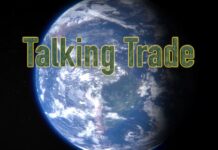In the latest episode of “Talking Trade,” FTI Consulting Managing Director Nick Baker says trade tensions with China are “guaranteed” to escalate going forward.
Baker, a licensed customs broker with the Washington, D.C.-based advisory firm, weighs in on the impacts of ongoing tariffs on Chinese goods. He predicted trade conflicts between the United States and China would continue to rise.
The interview was done before the election. Speakers from FTI Consulting are set to address an upcoming Madison International Trade Association event on Tuesday, being held in Pewaukee.
“The primary question is, how quickly, to what extent, and whether these are broad-stroke measures or more targeted,” Baker said.
He noted Donald Trump has established “very clear” tariff goals related to China.
“He is not shy about using the word tariff. I think on a recent podcast he said it’s his favorite word, maybe more favorite than the word love, which I thought was extreme,” Baker said. “But he’s been consistent in that messaging, and tariffs are his preferred negotiating tool.”
Trump has mentioned targets of 10% across all goods and 60% on all goods coming from China, Baker said, adding “you have to take these threats and comments seriously” given his track record on tariffs.
The United States currently has a trade-weighted average import tariff rate of 2% on industrial goods, the Office of the U.S. Trade Representative says. A variety of Chinese goods including solar panel cells, critical minerals, battery parts and more face tariffs ranging from 25% to 100%, according to an overview from New York based international law firm White & Case LLP.
While Congress has authority to levy duties and tariffs and set rates, legislation has shifted more of that power to the executive branch over time, according to Baker. He said mechanisms for enacting Section 301 tariffs in particular have “proven very effective.”
Under part of the Trade Act of 1974 focused on “unfair trade practices,” often just called Section 301, the United States can enact trade sanctions on countries that violate trade agreements or otherwise engage in “acts that are ‘unjustifiable’ or ‘unreasonable’ and burden U.S. commerce,” according to an overview from the Congressional Research Service.
“It does require an investigation by [the U.S. Trade Representative,] so there’s some administrative process behind it, but the support for those allegations can be very broad,” Baker said, adding “there’s a high likelihood that Trump will use 301 to expand the scope and degree of tariffs on products from China.”
He expects Trump will take actions under other trade acts to increase tariff rates while also pressuring other trade allies to “put similar pressure on China under the threat of retaliation.”
The interview also explores the potential for Section 232 tariffs on steel and aluminum to be used in further negotiations with trade partners and allies. Baker says threats of expanded tariffs in this area could be used “to negotiate other national security-related concessions,” such as restricting the flow of materials to China that could be used in making semiconductors, AI technology and renewable energy products.
“Trump is more likely to take aggressive measures, including initiating new and expanded 232 [tariffs,] which could go well beyond steel and aluminum,” he said. “Doing away with the exclusion process, or even renegotiating the existing relief with partners like Korea, Australia, EU, to get a ‘better’ deal.”
Talking Trade is hosted by E.M Wasylik Associates Managing Director Ken Wasylik and M.E. Dey & Co. President and Managing Director Sandi Siegel.
“Talking Trade” is now available in audio form on Apple Podcasts and Google Podcasts. Subscribe and find more episodes here.





